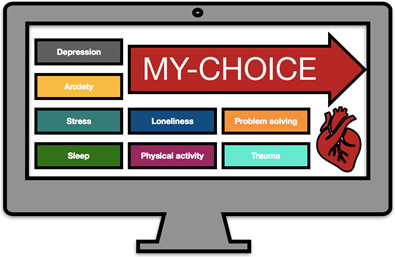Personalized internet-based treatment of anxiety and depression in patients with ischemic heart disease.

Goals of the project
The overall goal of the MY-CHOICE project is to develop and evaluate the efficacy of a patient-preferred, personalized, therapist-assisted eHealth treatment for depression and anxiety in patients with ischemic heart disease attending cardiac rehabilitation (CR). The intervention is patient-centered and holistic, as it targets not only depression and anxiety but also the most common challenges that patients are faced with when diagnosed with IHD, including fatigue, sleep problems, and difficulties adopting a healthy lifestyle.
The intervention will partly be built on the principles of Cognitive Behavioral Therapy but also include aspects from Acceptance and Commitment Therapy and Compassion Focused Therapy. However, as the intervention is flexibly targetable to the individual patient's needs and preferences and also designed to include and retain socially vulnerable patients and patients at risk of dropout – in addition to treatment modules targeted towards depression and anxiety – patients are allowed to choose treatment modules about topics that they want to work with in a dialogue with their therapist. These topics includes existential difficulties, loneliness etc.
The project has 3 phases:
Phase 1: Patient co-researchers with IHD and past or present depression and/or anxiety will work together with clinical psychologists to develop the eHealth modules in MY-CHOICE based on the premise of personalized medicine.
Phase 2: A feasibility test of the intervention with 15-20 patients.
Phase 3: The efficacy of the intervention will be tested in a randomized controlled trial.
Background
Ischemic heart disease (IHD) is a chronic disease, characterized by reduced blood supply to the heart that can lead to acute myocardial infarction, heart failure, cardiac arrest, and premature death. The number of patients with IHD has increased exponentially due to better treatment options and ageing of the population, with 21,000 new patients diagnosed in Denmark every year. To mitigate the impact of IHD, patients are referred to CR, a multi-disciplinary and multi-faceted effort primarily focused on physical training, patient education, and risk factor management. But dropout rates are high with up to 50%, warranting more attention towards barriers for CR participation and adherence. Studies have shown that especially patients who are psychologically and socially vulnerable are at risk of dropout. As many as one in five patients (20%) with IHD develops depression and anxiety that warrant treatment. The aim of this project is therefore to optimize CR to an extent that more vulnerable patients participate in CR, while also getting treatment of depression and anxiety.
Expected results
We want to give patients a more active role as advocates of their own health in the treatment process, while enabling treatment recommendations to be tailored to individual patients' needs and preferences. We expect that this will improve patient empowerment, adherence, treatment satisfaction, and quality of life, and may help prevent hospitalizations and overall enable patients to live a better life with their disease.
Project team
Professor Susanne S. Pedersen (PI), Psychologist, Department of Psychology, University of Southern Denmark and Department of Cardiology, Odense University Hospital;
Christina Maar Andersen, Psychologist, Department of Psychology, University of Southern Denmark;
Robert Ahm, Psychologist, Department of Psychology, University of Southern Denmark;
Søren Jensen Skovbakke, Physiotherapist, Department of Psychology, University of Southern Denmark;
Professor Jacob Hjelmborg, Statistician, Department of Epidemiology, Biostatistics and Biodemography, University of Southern Denmark;
Helle Lynge Kanstrup, Cardiologist, Department of Cardiology, Aarhus University Hospital;
Professor Lisbeth Frostholm, Psychologist, Department of Clinical Research, Aarhus University Hospital;
Professor Per Carlbring, Psychologist, Department of Psychology, Stockholm University
The project is supported with DKK 2 million from Karen Elise Jensen Fonden.